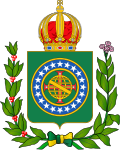João Lins Cansanção, Viscount of Sinimbu
Viscount of Sinimbu | |
|---|---|
 The Viscount of Sinimbu, c. 1874 | |
| Prime Minister of Brazil | |
| In office 5 January 1878 – 28 March 1880 | |
| Monarch | Pedro II |
| Preceded by | Duke of Caxias |
| Succeeded by | José Antônio Saraiva |
| Personal details | |
| Born | (1810-11-20)20 November 1810 São Miguel dos Campos, Alagoas, Colonial Brazil |
| Died | 27 December 1906(1906-12-27) (aged 96) Rio de Janeiro, Rio de Janeiro, United States of Brazil |
 Coat of Arms of the Viscount of Sinimbu | |
João Lins Vieira Cansanção de Sinimbu, Viscount of Sinimbu (20 November 1810, in São Miguel dos Campos – 27 December 1906, in Rio de Janeiro) was a Brazilian politician. He was President of the Council of Ministers from 5 January 1878 until 28 March 1880.[1][2] He served as the President of the Senate from 1887 to 1888.[3]
Biography
He was the son of captain-major Manuel Vieira Dantas and Ana Maria José Lins, born on the Sinimbu engenho, in São Miguel dos Campos, Captaincy of Pernambuco (current state of Alagoas). Sinimbu studied law at the Olinda Juridical Academy and then continued his education in Europe, where he excelled in legal medicine and chemistry studies in Paris and obtained a doctorate at the University of Jena in Germany.[4]
Upon returning to Brazil, Sinimbu began his political career, serving in various positions, including judiciary, police and diplomacy. He presided over the provinces of Alagoas and Sergipe, as well as serving as Brazil's resident minister in Montevideo.[5] Sinimbu also held ministerial positions, including Minister of Foreign Affairs and Minister of Agriculture, Commerce and Public Works.[4]
He stood out for introducing the decimal numeral system in Brazil during his tenure at the Ministry of Agriculture. Furthermore, he presided over the 27th Council of State and faced the Vintém Revolt, which arose due to popular discontent with tax increases.[6]
Sinimbu was appointed senator of the Province of Alagoas in 1856 and remained in that position until the Proclamation of the Republic. Before that, he had been deputy general and provincial deputy in his home state.[4] His political career was marked by a series of notable achievements, standing out in positions of significant importance in the political history of Brazil.
References
- ^ "Countries Br-Bu".
- ^ Esau and Jacob. Oxford University Press. 2000-11-30. ISBN 9780199761937.
- ^ "Império (1826-1889) - Senado Federal". www25.senado.leg.br.
- ^ a b c "Senado Federal - Brasil - Portal Senadores". 2014-08-23. Archived from the original on 2014-08-23. Retrieved 2023-10-31.
- ^ "João Lins Vieira Cansanção de Sinimbu". 2013-09-18. Archived from the original on 2013-09-18. Retrieved 2023-10-31.
- ^ DANNEMANN, Fernando (1879). A Revolta do VIntém (in Portuguese). Rio de Janeiro.
{{cite book}}: CS1 maint: location missing publisher (link)
- v
- t
- e
- History (Independence of Brazil, First Reign, Regency, Second Reign)
- Economy
- Nobility
- Provinces
- Units of measurement

| Political instances |
|
|---|---|
| Others |
| Armed Forces | |
|---|---|
| Wars |
|
| Abolitionists | |
|---|---|
| Others |













